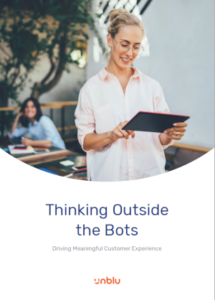Incumbent wealth firms will be challenged to transform their digital offering and business ecosystems to remain competitive in 2022, according to a report published today by Unblu.
Drawing on observations and insights based on their vast clientele of 160+ financial institutions globally and data from external researchers, Unblu’s report finds that the rapid acceleration of digital across all sectors has created a complex effect in wealth management. This has conditioned client preferences and employee relations considerably, breaking down industry conventions and leaving no room for organizational rigidity.
The picture is further complicated by the proliferation of WealthTech startups, as well as BigTech domination in every aspect of consumer life. Inevitably, this has pressurized the offerings of incumbent firms. As an example, the report looks at recent partnerships involving major players, from UBS’ recent acquisition of digital-only platform Wealthfront to JPMorgan Chase’s ESG ambitions with investment technology company OpenInvest. Both serve to emphasize the strategic advantage of leveraging digital and tech, but as the report highlights, it is also vital that innovation is self-initiated by traditional wealth management firms. Such a commitment will be integral to staying on top of burgeoning client segments, preferences, and changing workforces.

Industry shifts have ushered in new types of wealth management clients
Unblu’s report identifies several forces of demographic transformation affecting the wealth management landscape. Digital advancements have democratized the market to a certain degree, creating a ‘mainstream’ investment market. However, generational movements are also identified as an undercurrent of change. Coined as the ‘Great Wealth Transfer’, the implications will see close to $60 trillion in assets move from one generation to the next between now and 2060. While the full effect is yet to be seen, the report proposes that the resultantly younger pool of wealth management clients is a vital characteristic of the industry today.
As far as firms are concerned, shifts in client demographics should be seen as a call to action. No matter which segment firms wish to target, advancing digital client engagement is set to be a safe bet, be that through lower-cost automated advisory services or more robust digital wealth management experiences. Noting that 80% of millennials will look for a new financial advisor upon inheriting their parents’ wealth, the report also underlines the importance of digital-first and mobile-friendly experiences for retaining loyalties among a new generation of family clients.
Beyond digital, firms will want to take note of the favored products and preferences of emergent client segments. Digital assets and cryptocurrencies represent an untapped area of promise for wealth management firms, with 72% of HNWIs reporting that they’ve already invested in crypto. Equally, the report identifies a growing concern for social responsibility that has made ESG scoring a necessary competency for firms, while it attributes the rise of personalized stock indices to widespread consumer demand for more individualized services.
Firms should utilize digital and human competencies to reach new levels of customer centricity
On the topic of quality and delivery in digital wealth management, the report underlines the renewed importance of customer centricity in the present landscape. Following the disruption of the pandemic, firms must now find ways to deliver on the digital expectations that have been set. However, they must do this while maintaining human relationships.
For that, a hybrid delivery model emerges as the more sophisticated route for ambitious firms. Referencing a survey that saw over half of UK investors aged 18-25 report a loss of faith in robo-advisors throughout the pandemic, the report identifies an increasing appetite for human-led advice. To keep pace with these demands and foster client trust, firms will need to balance digital innovation with humanized, people-centric services.
This can also be extended to the pressing issue of cybersecurity. The expansion of digital touchpoints is not without its security implications, and clients are acutely aware of this fact. Drawing on regulatory failings by major players in the industry, the report recommends taking actions to avoid data silos and building monitored, integrated platforms for client communications. Infrastructures like these will not only bode well for client trust, but also help to deliver wealth management experiences that allow clients to seamlessly call, text, or video chat with advisors in a unified online environment.
“In the context of wealth management, the personalized aspect of the advisor-client relationship remains indispensable”, says Unblu CEO Luc Haldimann in the report’s overview. “To take a use case from one of our major wealth advisory customers, combining different digital capabilities to support personalized client journeys was vital in upgrading online interactions. Having previously faced issues with the integration of various CX tools, implementing Unblu provided our customer with a suite of connected features that enhance the quality—and security—of client-advisor interactions.”
Wealth management operations, resources and talent must reflect the dynamic landscape of today
Many firms will need to radically alter the fabric of their organizations to keep up with new industry developments, starting with people and resources. To some degree, a natural turnover is occurring in the wealth management workforce, with the Unblu report estimating that approximately one-third of US financial advisors are set to retire in the next 10 years. That said, a fresh approach to talent and resource management will also be required to meet the client demands of the day. Fostering flexibility, willingness to learn and growth mindsets among staff will create a dynamic workforce that is capable of adapting to new norms and needs.
Remote and hybrid ways of working are also expected to shape the future of wealth management, for clients and advisors alike. While many have adjusted to this in the past three years, the report suggests that the permanence of remote working arrangements will soon present firms with new challenges for compliance and workplace culture. Now that flexible options form a part of employee expectations, firms will be under pressure to take the initiative and develop strong operational models for the future of work. In doing so, they will be able to build workforces that can create lasting organizational value.
Report Methodology
The Digital Wealth Management Report 2022 draws on research work from two main sources. Principally, observations are based on collaborations and conversations with more than 160 financial institutions served by Unblu worldwide. These insights are supplemented by data and statistics from highly credible research bodies including Forrester, Gartner, McKinsey, Deloitte and Capgemini, among others.


















